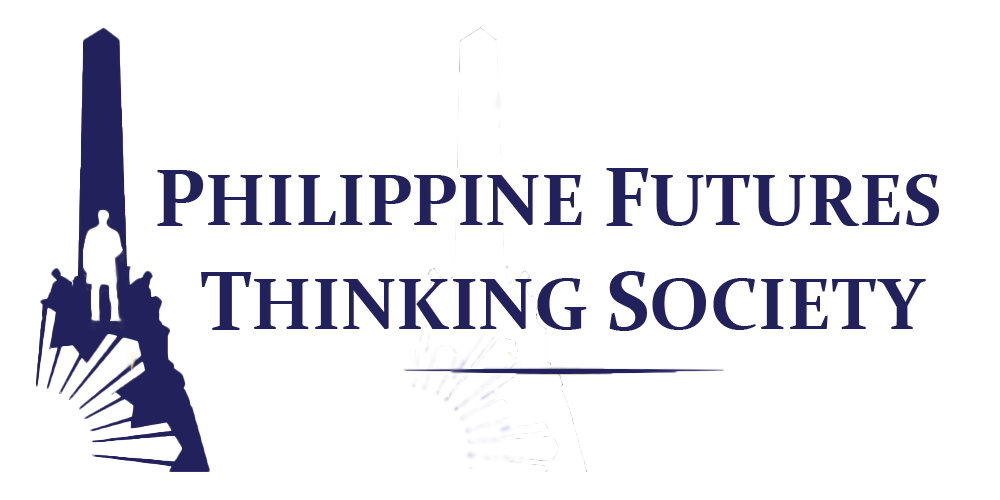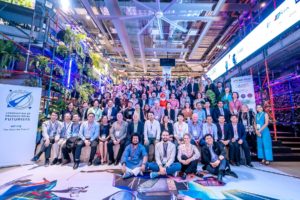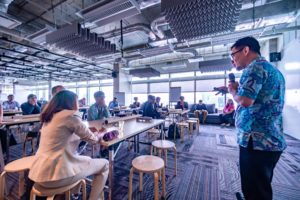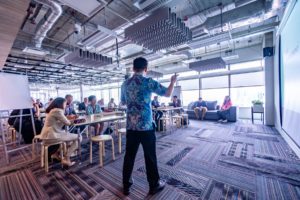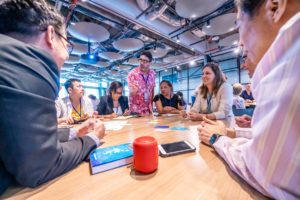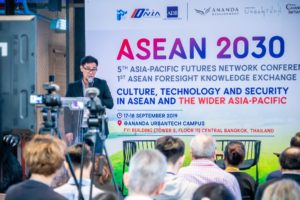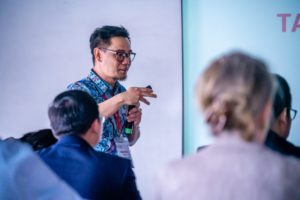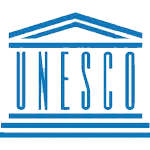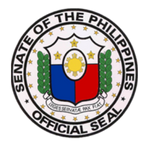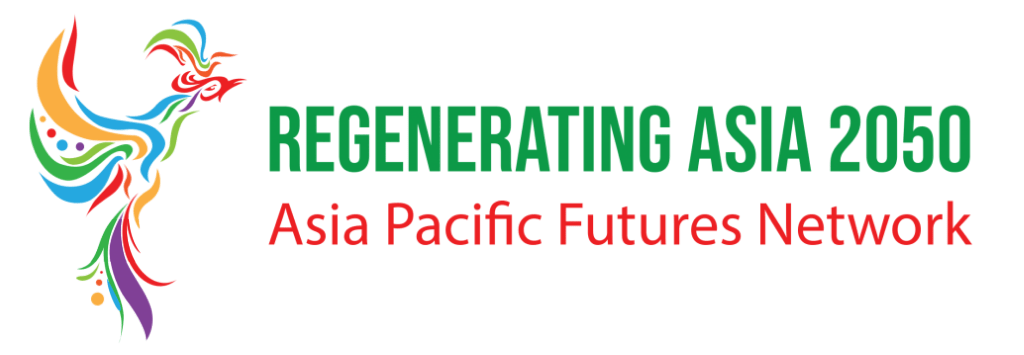
The Asia Pacific Futures Network
Launch
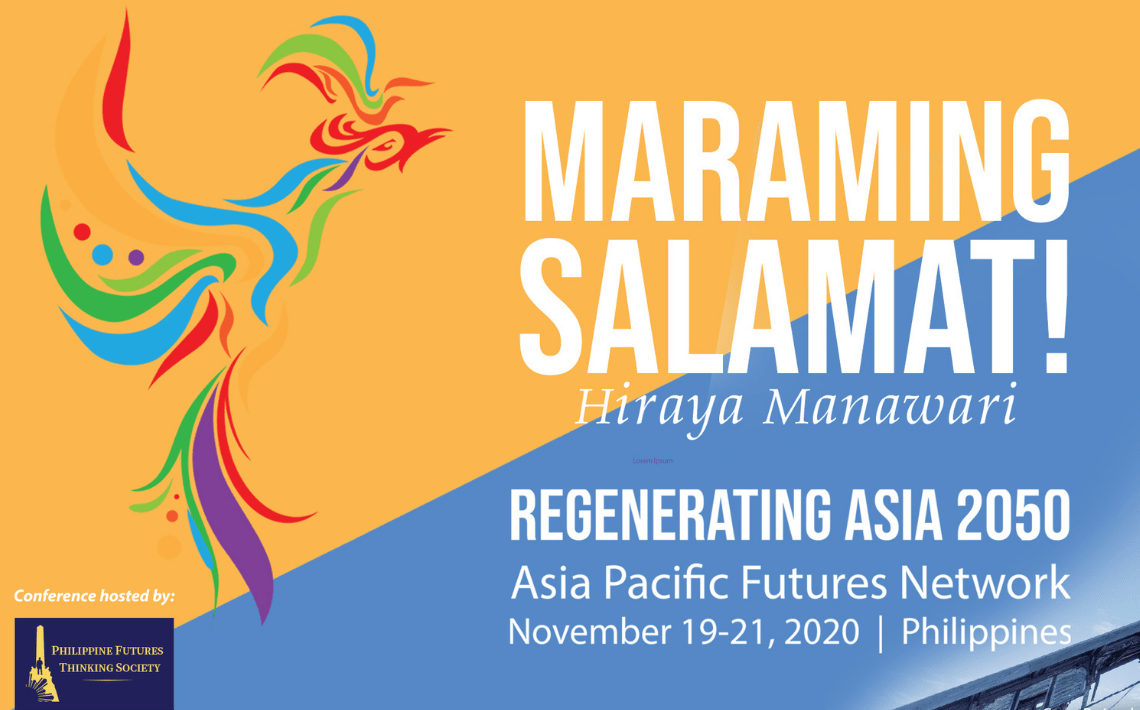
See Flavors of Practice: Developing the Asia Pacific Futures Network Report
The Asia Pacific Futures Network
About
The Asia Pacific Futures Network, a network of futurists and foresight practitioners in Asia and the Pacific region gathered to create the network in 2015. Representatives from futures-focused institutions explored, debated and discussed the history and futures of futures studies and foresight practice an Asian perspective. Representatives from Iran, Malaysia, Philippines, Singapore, South Korea, Taiwan, and the U.S. met from March 19-20th, 2015 at Tamkang University, Taiwan to co-create the APFN. Over the years, the APFN will be held in Seoul, South Korea; Bangkok Thailand and last year hosted in Manila, Philippines.
The Asia Pacific Futures Network Conference is organized specifically to:
- Explore how Asian perspectives and traditions, critically understood, inform Futures Studies;
- Spread foresight from government focus to civil society, small
- businesses, and corporate sectors;
- Strengthen existing informal networks;
- Build a stronger link with other future-focused networks and international organizations around the world;
- explore emerging issues that might likely challenge current trajectories of the Asia-Pacific region.
The objectives of the annual APFN Conference are:
- Imagine the futures of various Asian and Pacific countries and regions, explore disruptions and co-create alternative futures;
- Share methods, tools and innovations for futures thinking and strategic foresight;
- Support the advancement of methods, practices and complementary approaches to the changing needs of policymakers;
- Demonstrate how foresight has served to/can further influence policy processes and decisions;
- Promote cooperation and networking among participants as well as share experiences between members of diverse organizations and backgrounds;
- Stimulate the uptake of these approaches and exchange between practitioners and policymakers – ultimately to increase the profile and applications of futures thinking and foresight in the Asia-Pacific.
6th Asia Pacific Futures Network Global Conference
Event
Regenerating Asia 2050: Using Futures Literacy to Transform Governance, Culture, and Economy
The Philippine Futures Thinking Society in 2020 organized the first virtual Asia Pacific Futures Network Conference dubbed as Regenerating Asia 2050. The event was attended by 700 participants consisting of futurists and foresight practitioners from the Asia Pacific region and the rest of the world, policy-makers, senior government officials, teachers and professors, scientists, researchers, students of futures and foresight, public administration and governance. See the Hiraya-APFN event website
Futures Questions and Provocations
Event
Some Futures Questions and Provocations at the 6th APFN Conference
How might the futures of governance, culture, and economy look like from an Asian point of view? With its dizzying heterogeneity, can Asia grow coherently into the future? Can Asia curate a regenerative future in a post-pandemic or better yet post-normal world? How might that look like? The global pandemic has disrupted the way policy-makers, researchers, decision-makers, business leaders, innovators, and strategists perceive and envision the future today, can Asia learn better, embed culture and use futures literacy to transform ways of knowing, imagining and creating alternative, preferable and emergent future worlds? What has changed, or perhaps what has emerged within the field and practice of foresight? Has the Asian way of learning and doing anticipatory thinking and governance arrived?
For the past several years, the Asia Pacific Futures Network (APFN) has explored and unpacked diverse themes and topics shaping the futures of Asia. Professional futurists, future-oriented think tanks, universities and institutions from the Philippines, Taipei, Singapore, Malaysia, Brunei, Thailand, United Arab Emirates, South Korea, Kazakhstan, Bangladesh, Iran, China, Pakistan, India, Bangladesh, etc. have presented papers, shared case studies and pioneered participatory futures tools and methods to deconstruct, anticipate, and re-imagine the communities of futures thinking practices, education, leadership, the fourth industrial revolution, digital economy, decolonization, power and security systems in Asia. New insights and concepts, conversations, foresight programs, projects, initiatives, and actions came out of these conferences.
The gathering was in full three-days of global virtual conference. It explored and accentuated:
- Case studies and presentations that demonstrate how futures literacy has influenced decision-making, planning, leadership and policy processes i.e., government, corporate, civic, non-government, communities, etc.;
- Perspectives, provocations, viewpoints, and visions of a regenerative Asia or a regenerative society in a post-pandemic or post-normal world;
- Sharing of new futures thinking concepts, tools, methods, processes, and innovations in foresight through virtual action-learning workshops, games, and talk sessions;
- State of the Future in Asia – preferred, emerging and alternative future worlds;
- Collaboration, networking, and stimulate learning and exchanges between and among futurists, practitioners, policy-makers, decision-makers, planners, academics, and participants who are new to the field of futures literacy and strategic foresight.
For more about the Hiraya APFN 2020 Conference, recordings and proceedings, see: Asia Pacific Futures Network Virtual Conference 2020 Website
Watch APFN 2020 conference proceedings and recordings
Asia Pacific Futures Conference 2021
Event
This year the Philippine Futures Thinking Society was a knowledge partner of the 7th Asia Pacific Futures Network Conference. Dubbed as Recipes for Change, Co-Creating Post-Pandemic Futures Today, the event was organized by friends and colleagues from Bangkok, Thailand. See the 7th APFN Conference website
The conference intend to focus specifically on good practices and success stories, new and innovative approaches, and experience-sharing on how to create sustainable post-pandemic futures in the Asia-Pacific and beyond.
Based on current trends, what might the region look like in a post-pandemic future?
What are emerging issues/disruptors that could alter this trajectory?
How can we create sustainable societies and economies while tackling some of the biggest questions around issues such as climate change, nutrition or future pandemics?
And what are the alternative futures of the Asia-Pacific region?
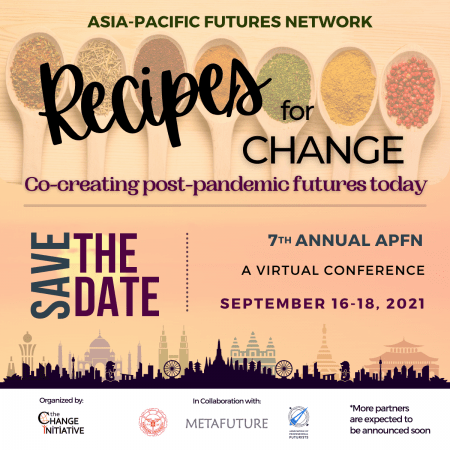
Hiraya Foresight at the 7th APFN Conference
7th AFPN Conference
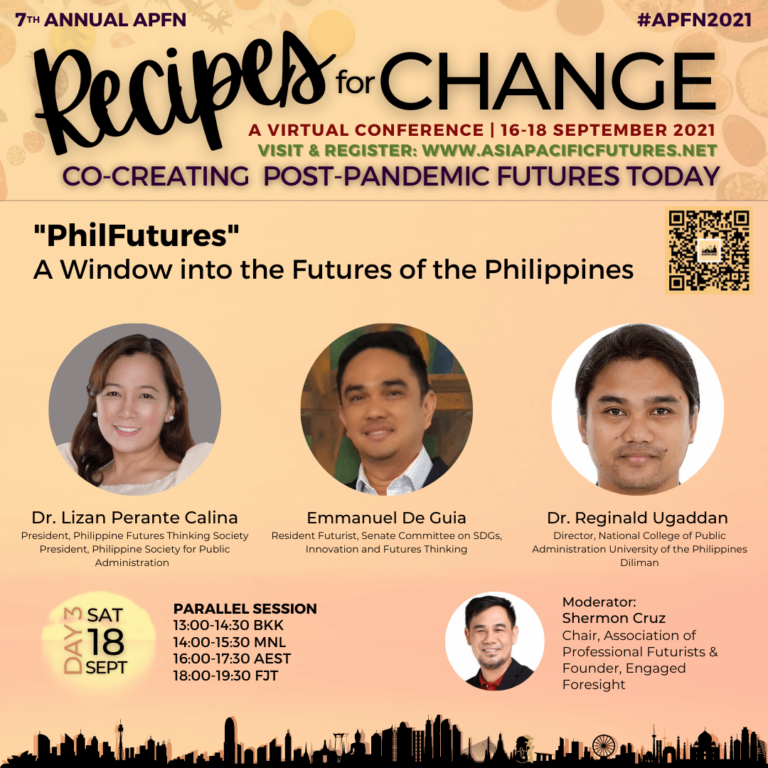
The session introduced Hiraya Foresight and exhibited the case of the Philippine Futures Thinking Society in democratizing futures knowledge and access through impact research, education, training and advocacy. It will explore and discuss indigenous finding ways and tools to reconceptualize foresight and its impact by fostering creativity, ethical imagination, anticipatory governance, leadership and socio-civic praxis.
The Philippine Futures Thinking Society organized last year’s Asia Pacific Futures Network Conference that was attended by 700 participants and more than a hundred futurists and speakers from different parts of the world. Since then, Philfutures network and voice in the Philippines and the larger global foresight community have grown considerably if not exponentially.
For more about the Asia Pacific Futures Network:
See the official website and YouTube account of the 7th APFN Conference this year.
In Collaboration With
Partners
